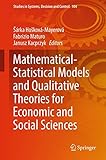Mathematical-Statistical Models and Qualitative Theories for Economic and Social Sciences [electronic resource] / edited by Šárka Hošková-Mayerová, Fabrizio Maturo, Janusz Kacprzyk.
Contributor(s): Hošková-Mayerová, Šárka [editor.] | Maturo, Fabrizio [editor.]
| Maturo, Fabrizio [editor.] | Kacprzyk, Janusz [editor.]
| Kacprzyk, Janusz [editor.] | SpringerLink (Online service)
| SpringerLink (Online service) .
.
Material type:  BookSeries: Studies in Systems, Decision and Control: 104Publisher: Cham : Springer International Publishing : Imprint: Springer, 2017Edition: 1st ed. 2017.Description: XVII, 437 p. 104 illus., 79 illus. in color. online resource.Content type: text Media type: computer Carrier type: online resourceISBN: 9783319548197.Subject(s): Computational intelligence
BookSeries: Studies in Systems, Decision and Control: 104Publisher: Cham : Springer International Publishing : Imprint: Springer, 2017Edition: 1st ed. 2017.Description: XVII, 437 p. 104 illus., 79 illus. in color. online resource.Content type: text Media type: computer Carrier type: online resourceISBN: 9783319548197.Subject(s): Computational intelligenceCorrelational Research of Expenditure Spend on Slovak Armed Forces Participation in Peace Support Operations Led by NATO -- Cost assessment of training using constructive simulation -- From the pictorial art to the linear transformations -- Do institutional or foreign shareholders influence national board diversity? Assessing board diversity through functional -- Cultural and Natural Heritage Challenges -- Sociological methods and construction of local welfare in Italy -- Some aspects of social life in Romanian villages in the interwar period.
This book presents a broad spectrum of problems related to statistics, mathematics, teaching, social science, and economics as well as a range of tools and techniques that can be used to solve these problems. It is the result of a scientific collaboration between experts in the field of economic and social systems from the University of Defence in Brno (Czech Republic), G. d’Annunzio University of Chieti-Pescara (Italy), Pablo de Olavid eUniversity of Sevilla (Spain), and Ovidius University in Constanţa, (Romania). The studies included were selected using a peer-review process and reflect heterogeneity and complexity of economic and social phenomena. They and present interesting empirical research from around the globe and from several research fields, such as statistics, decision making, mathematics, complexity, psychology, sociology and economics. The volume is divided into two parts. The first part, “Recent trends in mathematical and statistical models for economic and social sciences”, collects papers on quantitative matters, which propose mathematical and statistical models for social sciences, economics, finance, and business administration. The second part, “Recent trends in qualitative theories for economic and social sciences”, includes papers on qualitative matters, which discuss social, economic, and teaching issues. It is an ideal reference work for all those researchers interested in recent quantitative and qualitative tools. Covering a wide range of topics, it appeals in equal measure to mathematicians, statisticians, sociologists, philosophers, and specialists in the fields of communication, social and political sciences.


There are no comments for this item.